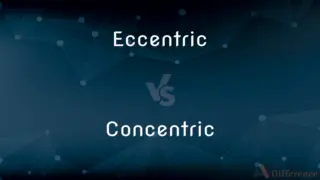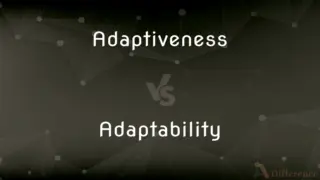Invention vs. Discovery — What's the Difference?
By Tayyaba Rehman — Updated on September 16, 2023
Invention refers to the creation of something new through human ingenuity, often solving a problem. Discovery is the act of finding or uncovering something that already exists but was previously unknown. Inventions are created; discoveries are found.

Difference Between Invention and Discovery
Table of Contents
ADVERTISEMENT
Key Differences
Invention involves the creation of something new through human intellect or creativity.
Discovery, on the other hand, pertains to the uncovering or realization of something that has always been there but was previously unknown or unrecognized.
Invention usually addresses a specific problem or need, often resulting in a tangible product or process.
Discovery often pertains to natural phenomena, scientific principles, or historical facts that exist independently of human action.
Invention implies human agency, while discovery can occur without direct human intervention.
ADVERTISEMENT
Comparison Chart
Nature
Creation
Uncovering
Implication
Problem-Solving
Realization
Source
Human Ingenuity
Natural World/Existing Knowledge
Tangibility
Often Tangible
May be Intangible
Human Agency
Required
Not Necessarily Required
Compare with Definitions
Invention
A creation resulting from human intellect or creativity.
Jazz is often considered an American invention.
Discovery
A legal term referring to pre-trial information gathering.
The defense attorney pressed for more discovery.
Invention
An imaginative work or concept.
The story was an invention of her own making.
Discovery
A natural phenomenon that is observed or found.
The discovery of gravity revolutionized physics.
Invention
A novel device, method, or process developed from study and experimentation.
His invention improved automobile safety.
Discovery
An insightful or innovative idea.
Her discovery about DNA won her a Nobel Prize.
Invention
A false or misleading statement or idea.
His excuse was pure invention.
Discovery
Realization of a fact or truth.
His discovery that the earth orbits the sun was groundbreaking.
Invention
An invention is a unique or novel device, method, composition or process. The invention process is a process within an overall engineering and product development process.
Discovery
The act or an instance of discovering.
Invention
The action of inventing something, typically a process or device
The invention of printing in the 15th century
Discovery
Something discovered.
Invention
The act or process of inventing
Used a technique of her own invention.
Discovery
(Law) The compulsory disclosure to the opposing party of factual information or documents relevant to a lawsuit prior to trial.
Invention
A new device, method, or process developed from study and experimentation
The phonograph, an invention attributed to Thomas Edison.
Discovery
Something discovered.
This latest discovery should eventually lead to much better treatments for disease.
Invention
A mental fabrication, especially a falsehood.
Discovery
(uncountable) The discovering of new things.
The purpose of the voyage was discovery.
Automatic discovery of RSS feeds by a Web browser.
Invention
Skill in inventing; inventiveness
"the invention and sweep of the staging" (John Simon).
Discovery
An act of uncovering or revealing something; a revelation.
Invention
(Music) A short composition developing a single theme contrapuntally.
Discovery
A pre-trial phase in which evidence is gathered.
The prosecution moved to suppress certain items turned up during discovery.
Invention
A discovery; a finding.
Discovery
Materials revealed to the opposing party during the pre-trial phase in which evidence is gathered.
The defense argued that the plaintiff's discovery was inadequate.
Invention
Something invented.
Discovery
The action of discovering; exposure to view; laying open; showing; as, the discovery of a plot.
Invention
The act of inventing.
The invention of the printing press was probably the most significant innovation of the medieval ages.
Discovery
A making known; revelation; disclosure; as, a bankrupt is bound to make a full discovery of his assets.
In the clear discoveries of the next [world].
Invention
The capacity to invent.
It took quite a bit of invention to come up with a plan, but we did it.
Discovery
Finding out or ascertaining something previously unknown or unrecognized; as, Harvey's discovery of the circulation of the blood.
A brilliant career of discovery and conquest.
We speak of the "invention" of printing, the discovery of America.
Invention
(music) A small, self-contained composition, particularly those in J.S. Bach’s Two- and Three-part Inventions.
I particularly like the inventions in C-minor.
Discovery
That which is discovered; a thing found out, or for the first time ascertained or recognized; as, the properties of the magnet were an important discovery.
Invention
(archaic) The act of discovering or finding; the act of finding out; discovery.
That judicial method which serveth best for the invention of truth.
Discovery
Exploration; examination.
Invention
The act of finding out or inventing; contrivance or construction of that which has not before existed; as, the invention of logarithms; the invention of the art of printing.
As the search of it [truth] is the duty, so the invention will be the happiness of man.
Discovery
The act of discovering something
Invention
That which is invented; an original contrivance or construction; a device; as, this fable was the invention of Esop; that falsehood was her own invention; she patented five inventions.
We entered by the drawbridge, which has an invention to let one fall if not premonished.
Discovery
Something that is discovered
Invention
Thought; idea.
Discovery
A productive insight
Invention
A fabrication to deceive; a fiction; a forgery; a falsehood.
Filling their hearersWith strange invention.
Discovery
(law) compulsory pretrial disclosure of documents relevant to a case; enables one side in a litigation to elicit information from the other side concerning the facts in the case
Invention
The faculty of inventing; imaginative faculty; skill or ingenuity in contriving anything new; as, a man of invention.
They lay no less than a want of invention to his charge; a capital crime, . . . for a poet is a maker.
Discovery
The act of finding or uncovering something previously unknown.
Columbus's discovery of America was monumental.
Invention
The exercise of the imagination in selecting and treating a theme, or more commonly in contriving the arrangement of a piece, or the method of presenting its parts.
Invention
The creation of something in the mind
Invention
A creation (a new device or process) resulting from study and experimentation
Invention
The act of inventing
Invention
The act of creating something new to solve a problem.
The invention of the light bulb changed human life.
Common Curiosities
How is Invention different from Discovery?
Inventions are created; discoveries are found.
Is an Invention always tangible?
Often, but not always; inventions can also be methods or processes.
Is a Discovery always tangible?
No, discoveries can be concepts, facts, or natural phenomena.
What is Discovery?
Discovery is the act of finding or uncovering something previously unknown.
Does Discovery solve a problem?
Not necessarily; discoveries can be purely observational.
What is Invention?
Invention is the creation of something new through human ingenuity.
Can Invention lead to Discovery?
Sometimes, inventions can aid in making new discoveries.
Is Invention a modern phenomenon?
No, inventions have occurred throughout human history.
Is human intervention required for Invention?
Yes, inventions are products of human ingenuity.
Can Discovery lead to Invention?
Yes, discoveries often pave the way for inventions.
Are all Discoveries groundbreaking?
No, though some can revolutionize our understanding of the world.
Does Invention solve a problem?
Typically, inventions address specific problems or needs.
Is human intervention required for Discovery?
Not necessarily; nature can reveal discoveries without human aid.
Are all Inventions useful?
Not necessarily; some may have limited or theoretical applications.
Is Discovery a modern phenomenon?
No, discoveries have been made throughout history and prehistory.
Share Your Discovery

Previous Comparison
Eccentric vs. Concentric
Next Comparison
Adaptiveness vs. AdaptabilityAuthor Spotlight
Written by
Tayyaba RehmanTayyaba Rehman is a distinguished writer, currently serving as a primary contributor to askdifference.com. As a researcher in semantics and etymology, Tayyaba's passion for the complexity of languages and their distinctions has found a perfect home on the platform. Tayyaba delves into the intricacies of language, distinguishing between commonly confused words and phrases, thereby providing clarity for readers worldwide.












































